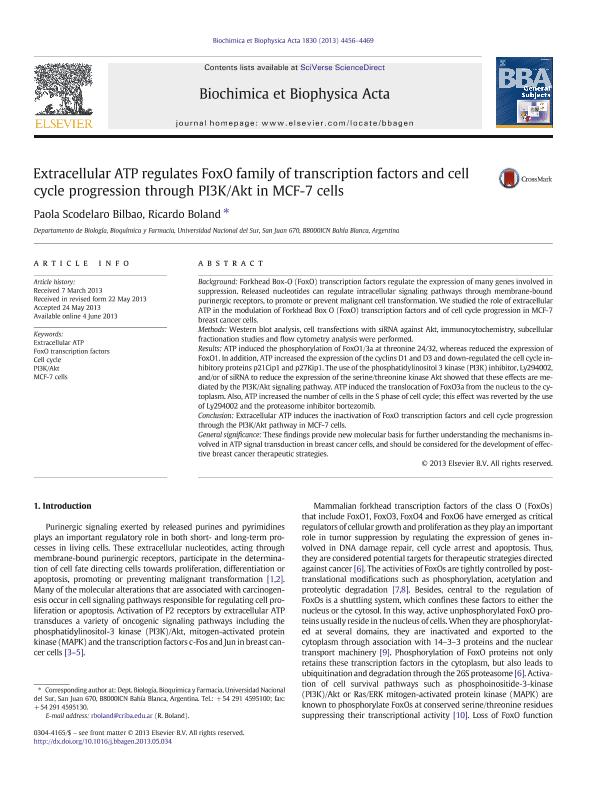Mostrar el registro sencillo del ítem
dc.contributor.author
Boland, Ricardo Leopoldo

dc.contributor.author
Scodelaro Bilbao, Paola Gabriela

dc.date.available
2016-09-09T17:40:58Z
dc.date.issued
2013-09
dc.identifier.citation
Boland, Ricardo Leopoldo; Scodelaro Bilbao, Paola Gabriela; Extracellular ATP regulates FoxO family of transcription factors and cell cycle progression through PI3K/Akt in MCF-77 cells; Elsevier; Biochimica Et Biophysica Acta- General Subjects; 1830; 10; 9-2013; 4456-4469
dc.identifier.issn
0304-4165
dc.identifier.uri
http://hdl.handle.net/11336/7581
dc.description.abstract
Background: Forkhead Box-O (FoxO) transcription factors regulate the expression of many genes involved in suppression. Released nucleotides can regulate intracellular signaling pathways through membrane-bound purinergic receptors, to promote or prevent malignant cell transformation We studied the role of extracellular ATP in the modulation of Forkhead Box O (FoxO) transcription factors and of cell cycle progression in MCF-7 breast cancer cells. Methods: Western blot analysis, cell transfections with siRNA against Akt, immunocytochemistry, subcellular fractionation studies and flow cytometry analysis were performed. Results: ATP induced the phosphorylation of FoxO1/3a at threonine 24/32, whereas reduced the expression of FoxO1. In addition, ATP increased the expression of the cyclins D1 and D3 and down-regulated the cell cycle inhibitory proteins p21Cip1 and p27Kip1. The use of the phosphatidylinositol 3 kinase (PI3K) inhibitor, Ly294002, and/or of siRNA to reduce the expression of the serine/threonine kinase Akt showed that these effects are mediated by the PI3K/Akt signaling pathway. ATP induced the translocation of FoxO3a from the nucleus to the cytoplasm. Also, ATP increased the number of cells in the S phase of cell cycle; this effect was reverted by the use of Ly294002 and the proteasome inhibitor bortezomib. Conclusion: Extracellular ATP induces the inactivation of FoxO transcription factors and cell cycle progression through the PI3K/Akt pathway in MCF-7 cells. General significance: These findings provide new molecular basis for further understanding the mechanisms involved in ATP signal transduction in breast cancer cells, and should be considered for the development of effective breast cancer therapeutic strategies.
dc.format
application/pdf
dc.language.iso
eng
dc.publisher
Elsevier

dc.rights
info:eu-repo/semantics/openAccess
dc.rights.uri
https://creativecommons.org/licenses/by-nc-nd/2.5/ar/
dc.subject
Extracellular Atp
dc.subject
Foxo
dc.subject
Cell Cycle
dc.subject
Pi3k/Akt
dc.subject.classification
Métodos de Investigación en Bioquímica

dc.subject.classification
Ciencias Biológicas

dc.subject.classification
CIENCIAS NATURALES Y EXACTAS

dc.title
Extracellular ATP regulates FoxO family of transcription factors and cell cycle progression through PI3K/Akt in MCF-77 cells
dc.type
info:eu-repo/semantics/article
dc.type
info:ar-repo/semantics/artículo
dc.type
info:eu-repo/semantics/publishedVersion
dc.date.updated
2016-05-10T14:34:40Z
dc.journal.volume
1830
dc.journal.number
10
dc.journal.pagination
4456-4469
dc.journal.pais
Países Bajos

dc.journal.ciudad
Amsterdam
dc.description.fil
Fil: Boland, Ricardo Leopoldo. Universidad Nacional del Sur; Argentina. Consejo Nacional de Investigaciones Científicas y Técnicas. Centro Científico Tecnológico Bahía Blanca. Centro de Recursos Naturales Renovables de la Zona Semiárida(i); Argentina
dc.description.fil
Fil: Scodelaro Bilbao, Paola Gabriela. Universidad Nacional del Sur; Argentina. Consejo Nacional de Investigaciones Científicas y Técnicas. Centro Científico Tecnológico Bahía Blanca. Centro de Recursos Naturales Renovables de la Zona Semiárida(i); Argentina
dc.journal.title
Biochimica Et Biophysica Acta- General Subjects

dc.relation.alternativeid
info:eu-repo/semantics/altIdentifier/url/http://www.sciencedirect.com/science/article/pii/S0304416513002304
dc.relation.alternativeid
info:eu-repo/semantics/altIdentifier/doi/http://dx.doi.org/10.1016/j.bbagen.2013.05.034
Archivos asociados
